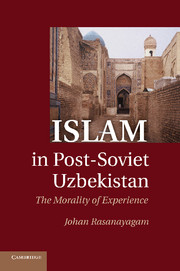Book contents
- Frontmatter
- Contents
- Illustrations
- Acknowledgements
- Note on Transliteration
- MAP: Uzbekistan and its neighbours
- Introduction: Towards an Anthropology of Moral Reasoning
- 1 Islam and Sociality in Pakhtabad and Samarkand
- 2 The New Soviet (Central Asian) Person and the Colonisation of Consciousness
- 3 Good and Bad Islam after the Soviet Union
- 4 The Practical Hegemony of State Discourse
- 5 The Moral Sources of Experience
- 6 Moral Reasoning through the Experience of Illness
- 7 Debating Islam through the Spirits
- 8 Experience, Intelligibility, and Tradition
- Notes
- Bibliography
- Index
Introduction: Towards an Anthropology of Moral Reasoning
Published online by Cambridge University Press: 01 March 2011
- Frontmatter
- Contents
- Illustrations
- Acknowledgements
- Note on Transliteration
- MAP: Uzbekistan and its neighbours
- Introduction: Towards an Anthropology of Moral Reasoning
- 1 Islam and Sociality in Pakhtabad and Samarkand
- 2 The New Soviet (Central Asian) Person and the Colonisation of Consciousness
- 3 Good and Bad Islam after the Soviet Union
- 4 The Practical Hegemony of State Discourse
- 5 The Moral Sources of Experience
- 6 Moral Reasoning through the Experience of Illness
- 7 Debating Islam through the Spirits
- 8 Experience, Intelligibility, and Tradition
- Notes
- Bibliography
- Index
Summary
On 13 May 2005, government security forces massacred hundreds of protesters in the city of Andijan, in Uzbekistan's portion of the Fergana Valley. Accounts are contested, and reliable facts are hard to come by, given the Uzbekistan government's efforts to restrict the flow of information. International human rights and crisis monitoring groups claimed that as many as 750 people were killed, the vast majority of whom were unarmed civilians protesting the economic hardship caused by corruption, government repression, restrictive government regulations on trade, and the arbitrary arrest of individuals on charges of religious extremism. The government, for its part, claims that the demonstrators were armed Islamist extremists and terrorists who had forced civilians into the square as human shields, and that fewer than 200 were killed, most of whom were the gunmen themselves or security service personnel (Human Rights Watch 2005; Kendzior 2007; Khalid 2007, 192; Megoran 2008). The protests were sparked by the trial of a group of local businessmen on charges of religious extremism and involvement in a banned Islamic group named as ‘Akromiya’ by the state prosecutors. The trial itself attracted large demonstrations by the relatives and supporters of the accused, who protested their innocence and criticised the unfairness of the criminal justice process. At the conclusion of the trial, a group of armed men stormed the prison in Andijan in which the businessmen were being held and freed them, along with hundreds of other prisoners, many of whom were also convicted on charges of religious extremism.
- Type
- Chapter
- Information
- Islam in Post-Soviet UzbekistanThe Morality of Experience, pp. 1 - 26Publisher: Cambridge University PressPrint publication year: 2010



